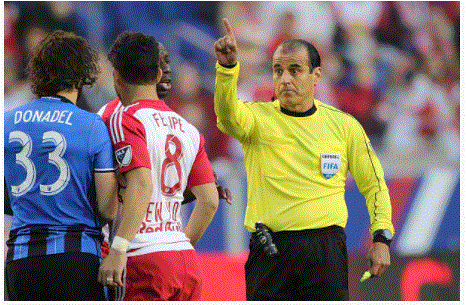I almost don't know where to start when talking about this game. So I'll start with a disclaimer: I am not a person that reflexively blames referees for costing a team points. Most times, when there's a controversial call in a game, there were other things that happened that, had they gone the "right" way, would have rendered the bad decision(s) moot.
In this game alone, for instance, there were two shots in quick succession that hit, in order, the crossbar and the post. There were a couple other good chances that went begging. And then there were most of the last 10 minutes, which...ouch.
So, long story short: I do not blame the Timbers' loss to Orlando City on Baldomero Toledo. Not entirely, anyway. But the two Toledo-driven incidents in this game, one in the first half and one in the second, absolutely helped shape this game and shape it in a way that did not do the game any favors.
The first incident was the incorrect awarding of a second yellow card to Sebastian Blanco for what, in Toledo's view, was simulation. But let's look at the play again, shall we?
This replay only gives one angle of it, but even from this angle, it's fairly clear that Blanco was legitimately brought down by OCSC's Mohamed El-Munir; it wasn't particularly dirty or nasty, but in no world was it embellishment by Blanco. Legs got tangled, El-Munir wasn't really playing the ball, and what should have been a straightforward penalty became a VAR-resolved mess that resulted in Blanco remaining in the game and Diego Valeri burying the resulting penalty to give the Timbers the lead.
This brings us to the second penalty, in the 80th minute. Dom Dwyer was barreling in towards goal and went shoulder-to-shoulder with Alvas Powell. There was no real intent on either player's part to bring the other down, it was just one of those collisions that happen all the time when two players are heading for the same spot looking for the ball, and not paying super close attention to each other. But Toledo, in his infinite...let's not call it "wisdom", but in his own way, thought that Powell was deserving of being called for the foul there.
Unlike the Blanco foul, this one was not subject to VAR, so the incredibly bad judgment of an incredibly bad referee was allowed to stand. Orlando buried the penalty, and the game wasn't the same.
Again: I am not saying that Toledo cost the Timbers the game. Blame for that lies with Gio Savarese's odd defensive substitutions, with the Timbers' inability to convert a few shots that on any other day would be goals, and additionally with the Timbers' seeming lack of understanding of the rules of the game, particularly as regards duration of play.

The issue I have with Toledo, really, is that he takes things personally and makes the game about him. The first card he gave to Blanco, early on in the game, was for not backing up 10 yards from a corner OCSC was due to take. Which, fine, that was petty and dumb on Blanco's part, and was a bad card to pick up. But that should have been that.
The problem is that, after that, Toledo decided that Blanco was going to be at fault for things for the rest of the game, no matter what. There's no way Toledo can claim with a straight face that he got the simulation one right initially - we'll never know because referees are not accountable to the media or the public, but from the outside, it seems for all the world like Toledo was retaliating against Blanco for...reasons? Bruising Toledo's ego? Something.
Whatever the reason, Toledo's continued presence in MLS is representative of a standard of refereeing that MLS should be desperately trying to get away from. I will be the first to admit that MLS refereeing has been getting better in the last few seasons - the problem is, overall, it's still not great. It's inconsistent from game to game, it's inconsistent within a game depending on the referee, and even in a subjectively adjudicated sport like soccer, the standards that get applied in MLS are opaque at best and, as we saw in yesterday's game, random and petty at worst.
VAR is a pretty big help, but it also is built with a pretty large flaw. There is a VAR referee in the booth who signals the center referee when a play should be reviewed, but the center referee retains final authority on whether it does get reviewed or not. And if the center ref does review a call, it's also up to that center ref - not, crucially, to the VAR official in the booth - whether the call stands or is overturned.
This is a huge problem because it leaves the solution to the problem in the hands of the person that caused the problem, who may not even agree it was a problem in the first place. If VAR is to succeed, the VAR official in the booth must be given the power to require the center ref to review an eligible play, not just recommend it, and they must subsequently have the power to overrule the center ref if, once reviewed, the center ref's decision was shown to be incorrect and the center ref decides not to overrule himself.
As it is now, there's no backstop if the center ref sees what should be a card- or penalty-worthy incident ignores it, and subsequently upon review still feels it's not. This defeats the purpose of having VAR in the first place - it's not a review if the reviewer isn't taking it seriously. Only by having a disinterested third party reviewer will VAR be truly effective.
It's true that Toledo reversed himself on the Blanco call, but the fact that the Powell/Dwyer incident didn't even warrant a review is inexcusable, and it's all down to the fact that the person who decides on a review is the center ref who made the mistake in the first place.
Until MLS fixes its refereeing problem, it can pursue all the growth in the world, but it'll still be a league that needs a lot of work if it wants to be taken seriously by a large segment of its fanbase, much less the rest of the world, as they seem to want very badly.










































